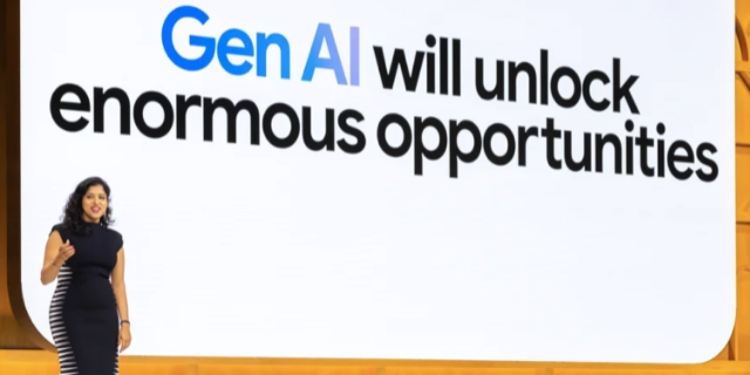An evolution of attention is underway. People have seemingly endless ways to shop, communicate and stay entertained online. For advertising to stand out, it needs to be relevant and helpful — in fact, that’s more important than ever before. Businesses need to be on every surface with creative assets thatcapture people’s attention.
Until now, it has felt impossible to do this at scale but that’s changing with generative AI. This technology is helping us better meet advertisers’ needs and unlock new possibilities across the marketing process, from new immersive ads experiences to high-performing creative assets. As we build this next era of marketing together, we’re sharing our latest creative asset generation controls, new ads experiences, visual storytelling features and more at Google Marketing Live (GML).
Scaling creative production in line with brand standards
We’ve been working on making it easier and faster to produce great creative assets for ads across marketing channels. Creative asset variety is crucial to strong ads and achieving this has gotten easier for more advertisers with generative AI in Performance Max. We found that advertisers who improvetheir Performance Max Ad Strength to Excellent see 6% more conversions on average.
Event Tickets Center was one of the earliest beta testers for asset generation in Performance Max, which has helped the team accelerate creative production by 5x with less time and effort.
Still, performance isn’t everything for creative. Assets also need to be in line with brand standards. Soon, advertisers can share their font and color guidelines in Performance Max, as well as provide helpful image reference points to generate new asset variations.
We’re also introducing new image editing capabilities so advertisers can try adding new objects, extending backgrounds, and cropping to adapt images to any format, size and orientation. Additionally, retailers will be able to highlight their products from their Google Merchant Center feeds and take advantage of these editing capabilities. As advertisers explore creative ideas, Google AI will generate more recommendations showing products in different contexts and scenarios, so advertisers can select the assets they love and use them across their marketing channels.
Bringing creative assets to life with new immersive ad experiences
Even with great image and text assets in ads, it can be hard for consumers to feel confident making purchase decisions online without seeing a product in person or trying it on. Yet our research shows this type of confidence is critical for brands. Generative AI can help businesses better convey offerings and inspire confidence in consumers right from the ad. Advertisers will soon be able to enhance their Shopping ads with immersive visuals including Virtual Try-On and generated 3D ads, and we’re introducing a feature that lets shoppers dive deeper into an ad to see product videos, summaries andsimilar products provided by the advertiser.
We’re also currently testing a new ad experience in Search to help guide people through complex purchase decisions. Let’s say friends are renovating and they search for “short term storage.” Clicking an ad for a storage facility may lead to a dynamic experience where AI helps them figure out what they need. If they share details, like photos of furniture and their budget, Google AI could then recommend storage unit sizing and packing materials with a link to purchase on the website.
Driving demand and conversions through visual storytelling
Beyond visually immersive ads, there are opportunities to connect with consumers on our most visually immersive channels — YouTube, Discover and Gmail. We launched Demand Gen campaigns last year,which can reach up to 3 billion users monthly. These campaigns have helped advertisers drive demand
and conversions, and soon we’ll roll them out to even more advertisers on Display & Video 360 andSearch Ads 360. YouTube Shorts has over 2 billion logged-in users every month,3 discovering new favorites through
short-form video. We’re introducing new formats and features to help businesses engage with these viewers, including vertical ad formats, ad stickers to drive action and new animated image ads
automatically created from images in advertisers’ accounts and Demand Gen product feeds.
Creating new opportunities to help consumers along their information journey
Ads have always been an important part of consumers’ information journeys. At Google I/O, we announced that AI Overviews in Search are rolling out to everyone in the US, with more countries coming soon. AI Overviews will appear in search results when they’re particularly helpful beyond what
Search offers today. With AI Overviews, people are visiting a greater diversity of websites for help with more complex questions; we also see that the links included in AI Overviews get more clicks than if the page had appeared as a traditional web listing for that query. In fact, we’ve found that people who use AI Overviews actually use Search more and are more satisfied with their results. And when people click to links from AI Overviews, these clicks are higher quality, where users are more likely to spend more time on the site. As we continue to test and evolve the Search experience, we’ll remain focused on sending valuable traffic to publishers and creators.
In early testing, we’ve heard that people find the ads appearing above and below the AI-generated overview helpful. Soon, we’ll start testing Search and Shopping ads in AI Overviews for users in the US. They will have the opportunity to appear within the AI Overview in a section clearly labeled as “sponsored” when they’re relevant to both the query and the information in the AI Overview. There’s no action needed from advertisers: Ads from existing Search, Performance Max, and Standard Shopping campaigns have the opportunity to appear within the AI Overview. As we move forward, we’ll continue to test and learn new formats, getting feedback from advertisers and the industry.
Improving results with a strong foundation of measurement
While all of these updates are helpful for businesses, AI is only as good as the information it’s given. To get the most out of AI, businesses need a strong measurement strategy built on a foundation of first-party data. Many businesses have data from different sources, from conversion data to email lists and surveys. Until now, getting a complete picture has been very complex, especially for small businesses. But we’re making that much simpler for advertisers with Google Ads Data Manager, which is now available to everyone. This allows advertisers to easily bring sources of first-party data together in one place to use, analyse and activate — so what once could take weeks or months now takes minutes.
Putting Google AI to work for businesses
Guided by our AI principles and customer feedback, these latest AI innovations will help marketers think bigger, create bolder and drive results faster. Google AI is there to assist, not replace: Human creativity, strategic insight and expertise will always be a marketer’s advantage. W also recognize that as exciting as these advancements are, the shift to AI is a lot to manage for many businesses. We’re being thoughtful about evolving our products with that in mind, and we look forward to your feedback along the way.
At GML, we’ll also be introducing new ways merchants can use generative AI to connect more deeply with customers and market their brands and products more efficiently.
Article Authored by Vidhya Srinivasan, Vice President / General Manager, Ads Google


















